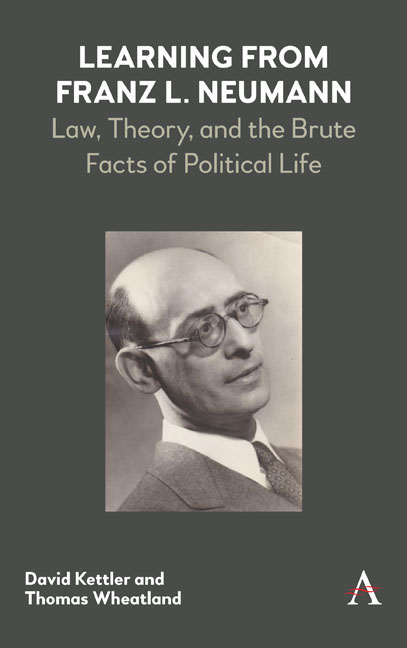Book contents
- Frontmatter
- Contents
- Chapter 1 The Challenge of Franz L. Neumann
- Chapter 2 Social Constitution, Social Power and Responsibility: Neumann and Labor Advocacy
- Chapter 3 Power, Resistance and Constitutions
- Chapter 4 Franz Neumann's Commemoration of Exile
- Chapter 5 After Weimar: The First Exile
- Chapter 6 Neumann's Second Exile: Negotiating the Politics of Research
- Chapter 7 No Happy End: Unprofitable Negotiations
- Chapter 8 Behemoth: Wars Can Be Lost
- Chapter 9 Franz Neumann in Washington: The Political Intellectual at War
- Chapter 10 Franz Neumann in the University: La guerre est finie
- Chapter 11 The Legacy: Four Studies
- Conclusion
- Index
Conclusion
Published online by Cambridge University Press: 06 September 2019
- Frontmatter
- Contents
- Chapter 1 The Challenge of Franz L. Neumann
- Chapter 2 Social Constitution, Social Power and Responsibility: Neumann and Labor Advocacy
- Chapter 3 Power, Resistance and Constitutions
- Chapter 4 Franz Neumann's Commemoration of Exile
- Chapter 5 After Weimar: The First Exile
- Chapter 6 Neumann's Second Exile: Negotiating the Politics of Research
- Chapter 7 No Happy End: Unprofitable Negotiations
- Chapter 8 Behemoth: Wars Can Be Lost
- Chapter 9 Franz Neumann in Washington: The Political Intellectual at War
- Chapter 10 Franz Neumann in the University: La guerre est finie
- Chapter 11 The Legacy: Four Studies
- Conclusion
- Index
Summary
In the spring of 1954, Franz Neumann advised the older of the present authors to abandon a grandiose dissertation project on numerous writers attacked by Karl Popper as “historicists” and to limit his study to the little- known Scottish moral philosopher, Adam Ferguson, who is occasionally classed with this tendency. It was not until many years later that the point of the assignment became altogether clear. Ferguson had to be understood as a writer in two distinct modes. He was an unoriginal moral philosopher in the Common Sense school designed to counter David Hume's skeptical philosophy, but he was also a teacher and commentator who viewed social and political designs from the standpoint not of the “spectator” but of the “actor.” It was in the latter capacity that he projected a scheme of strategic norms for conflict- ridden historical phases rather than abstract moral maxims based on universal laws of human nature to provide orientation for active participants in social and political actions. The commercial society, he thought, precluded civic virtue in the classical sense, but it opened a range of other ethically meaningful choices and set a menu of weighty political alternatives. His master was Montesquieu. Yet, since he was a contemporary of Adam Smith, he offered a more complex reading of the modern social structure, with special emphasis on the division of labor as a critical irremovable factor, a refinement for which he was acknowledged by Karl Marx. Neumann's Marx is above all the Marx of the political journalism, Marx as public teacher. That is, we think, what it means to be a public intellectual. We have followed Neumann quite closely through his years of political study and intervention, acknowledging his evasions, errors and perplexities because we think practical political understanding entails such risks and because we think also that his career exemplifies the highest standards of such an undertaking, due ultimately to his deep respect for evidence and his openness to instruction through experience as well as the thoughts of others. The greatest tribute to Franz Neumann is that there cannot be a “Neumann school” as there is a school— to remain within his generation of exile scholars— of Leo Strauss and Hanna Arendt. Thinkers like Franz Neumann are not authorities to be accepted or denied: they are intellectuals to be reckoned with, even some generations later.
- Type
- Chapter
- Information
- Learning from Franz L. NeumannLaw, Theory, and the Brute Facts of Political Life, pp. 467 - 468Publisher: Anthem PressPrint publication year: 2019



